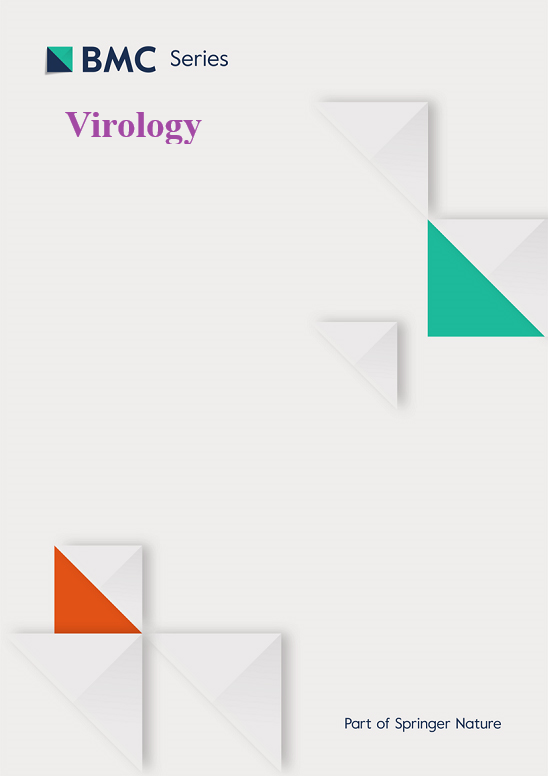ISG15 depletion enhances oHSV-1 replication and antitumor efficacy in oral squamous cell carcinoma
IF 2.8
3区 医学
Q3 VIROLOGY
引用次数: 0
Abstract
Oncolytic viruses (OVs) represent a promising experimental therapy for a range of cancers, including oral squamous cell carcinoma (OSCC). In this study, oHSV refers to an oncolytic virus engineered from HSV-1(Herpes Simplex Virus Type 1). The oHSV-1 is an oncolytic virus derived from HSV-1, where both copies of the ICP34.5 coding sequences have been replaced with the EGFP gene, and the ICP47 gene has been deleted. In previous studies, resistance was observed in certain SCC15 xenograft models treated with oncolytic herpes simplex viruses (oHSV-1). Primary tumor cells were extracted from these resistant models, followed by RNA sequencing with SCC15 cells as controls. Analysis revealed that ISG15 expression was upregulated in the resistant primary cells, as well as in HSV-infected breast cancer cells (GSE137757). In this study, we confirmed that knockdown ISG15 in SCC15 cells enhanced oHSV-1 replication, while ISG15 overexpression suppressed it. Mechanistic studies demonstrated that ISG15 inhibits oHSV-1 replication via ISGylation. To improve the therapeutic efficacy of oHSV-1, an oHSV-1 variant expressing ISG15-targeting short hairpin RNA (shRNA), termed oHSV-1-shISG15, was engineered. oHSV-1-shISG15 exhibited enhanced antitumor efficacy compared to oHSV-1 in vitro and in vivo. These findings suggest that ISG15 depletion augments oHSV-1 replication in OSCC tumor cells through ISGylation inhibition. Meanwhile, this study provides a novel recombinant oncolytic virus to potentiate the efficacy of oncolytic herpes virotherapy.
ISG15缺失可增强oHSV-1在口腔鳞状细胞癌中的复制和抗肿瘤效果
溶瘤病毒(OVs)代表了一种很有前途的实验性治疗一系列癌症,包括口腔鳞状细胞癌(OSCC)。在本研究中,oHSV是由HSV-1(1型单纯疱疹病毒)改造而成的溶瘤病毒。oHSV-1是一种衍生自HSV-1的溶瘤病毒,其中ICP34.5的两个拷贝编码序列都被EGFP基因取代,ICP47基因被删除。在先前的研究中,在溶瘤性单纯疱疹病毒(oHSV-1)治疗的某些SCC15异种移植模型中观察到耐药性。从这些耐药模型中提取原发肿瘤细胞,然后以SCC15细胞为对照进行RNA测序。分析显示,ISG15在耐药原代细胞以及hsv感染的乳腺癌细胞(GSE137757)中表达上调。在本研究中,我们证实了在SCC15细胞中,ISG15的下调增强了oHSV-1的复制,而ISG15的过表达抑制了oHSV-1的复制。机制研究表明,ISG15通过isg酰化抑制oHSV-1复制。为了提高oHSV-1的治疗效果,我们设计了一种表达isg15靶向短发夹RNA (shRNA)的oHSV-1变体,称为oHSV-1- shisg15。oHSV-1- shisg15在体外和体内均表现出比oHSV-1更强的抗肿瘤作用。这些发现表明,ISG15缺失通过isg酰化抑制,增加了OSCC肿瘤细胞中oHSV-1的复制。同时,本研究提供了一种新的重组溶瘤病毒,以增强溶瘤性疱疹病毒治疗的疗效。
本文章由计算机程序翻译,如有差异,请以英文原文为准。
求助全文
约1分钟内获得全文
求助全文
来源期刊

Virology
医学-病毒学
CiteScore
6.00
自引率
0.00%
发文量
157
审稿时长
50 days
期刊介绍:
Launched in 1955, Virology is a broad and inclusive journal that welcomes submissions on all aspects of virology including plant, animal, microbial and human viruses. The journal publishes basic research as well as pre-clinical and clinical studies of vaccines, anti-viral drugs and their development, anti-viral therapies, and computational studies of virus infections. Any submission that is of broad interest to the community of virologists/vaccinologists and reporting scientifically accurate and valuable research will be considered for publication, including negative findings and multidisciplinary work.Virology is open to reviews, research manuscripts, short communication, registered reports as well as follow-up manuscripts.
 求助内容:
求助内容: 应助结果提醒方式:
应助结果提醒方式:


